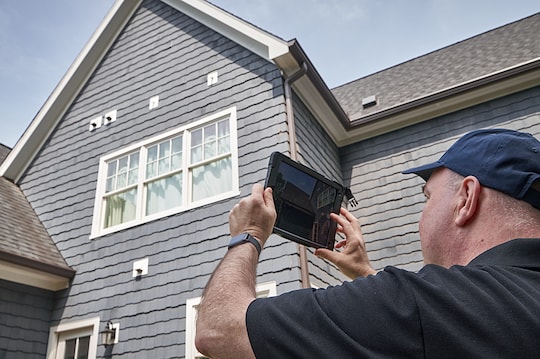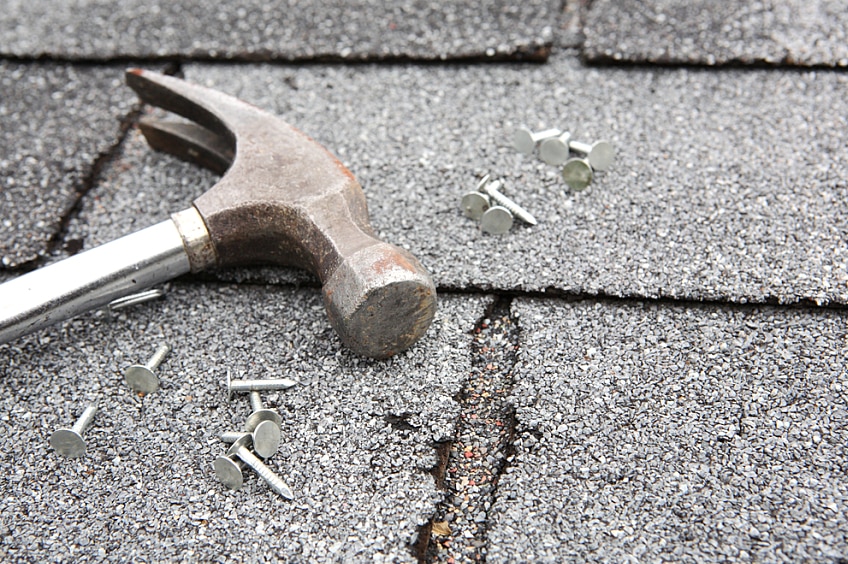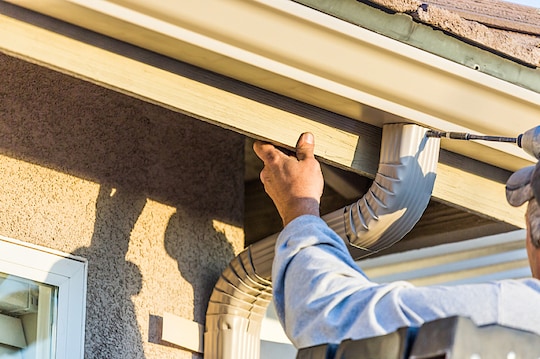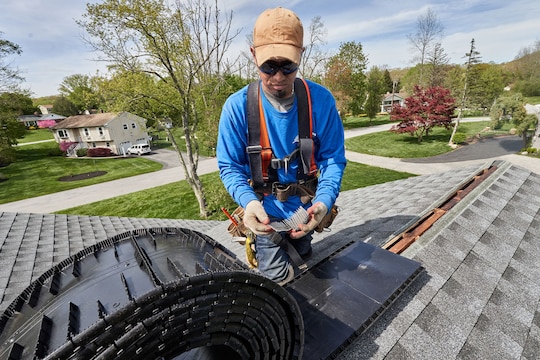
If you spot a roof leak, it could be a sign to schedule a roof repair. It's critical to catch roof leaks before they progress into challenges that are harder and more expensive to fix—or require an entire roof replacement.
Use this handy guide to stay proactive about your home's roof maintenance and resolve minor roof leak repair issues before they become expensive problems.
How to Identify a Roof Leak
Not sure how to find a roof leak or identify roof problems? Learn how to identify the warning signs associated with roof leaks and damage. Look inside and outside the home for these telltale signs.
Indoor Signs of a Roof Leak
Ceiling and wall stains: Look for moist areas as well as yellow or discolored ceiling spots.
Peeling or blistering paint: Check interior walls and ceilings.
Moisture in the attic: Search for moist areas on the attic ceiling, wetness or leaks inside the attic after a storm, or staining on the attic ceiling or walls.
Outdoor Signs of a Roof Leak
Decking decay: Moisture trapped in the sheathing (roof decking) can destroy roofs. Be alert for sagging decking, broken gutters, or groups of missing shingles.
Damaged shingles: Note any curled, torn, or missing roof shingles as they can let in moisture and water.
Roughed-up roof flashing: Missing or damaged weather-sealing materials around roof perimeters can lead to leaks.
Visible roof damage: Check for holes, debris, or other visible roof issues due to weather events, accidents, or age.
Not all roof damage results from leaks. When checking for leaks, be on the lookout for excess granule loss on shingles which may indicate wind blown debris or hail damage as well. Often times, dark streaks can indicate moss, lichen, or blue-green algae. If left unchecked these factors can create aesthetic issues. A professional contractor can help you with these concerns.
What to Do after Finding a Roof Leak
If you find a roof leak, address the issue as soon as possible. Unresolved roof leaks can lead to roof damage, moisture damage, mold, and eventually structural damage—potentially even requiring a total roof replacement.
Unfortunately, roof leaks won't go away just because they're ignored, and repair costs will increase the longer the problem persists. If cost is a concern, consider financing a roof repair.
After finding a roof leak, another option would be to check the terms of your roof warranty. Contact a trusted contractor for an inspection; if you don't have one, research roofing contractors in your area. Consider working with a roofer who is certified by a reputable manufacturer, such as a contractor certified by GAF*. Additionally, if your leaks were caused by storm damage, you might consider filing a claim with your homeowner's insurance company.
If you're debating replacing a roof versus repairing it, it's best to defer to the roofing professionals. In some cases, a minor shingle repair will solve the problem. In others—such as after damage from a major storm or long-term moisture issues—a roof replacement may be necessary.
Understanding Costs
A roof repair doesn't have to break the bank. Oftentimes, a homeowner's insurance policy will cover the cost. Keep in mind that insurance typically covers damage costs based on when the leak occurred. This means that if you wait a year to report a leak, those additional damage costs related to the untreated leak are billed to you.
Insurance often covers the costs of storm-related roof damage, but it may not cover flood-related damage. Be sure to communicate with your insurance agent if you want flood coverage for your home.
If you plan to pay out of pocket, contractors typically provide free quotes to help you understand the needed repairs as well as the material and labor costs. Even if you can afford to pay up-front, though, financing your repair can be a smart money strategy for your family.
What to Expect from a Contractor Roof Repair Quote:
Measurement of the area that needs roof repair
A roof inspection
Advice on the best materials for the job
A quote that includes labor, materials and applicable fees
Factors That Impact Your Roof Leak Repair Cost:
The project's size, scope, and complexity
Which materials you select
Geographic location, which affects local labor costs, material supply, and code requirements
If you find yourself doing a search for, "How can I find a roof repair near me, a roof replacement near me, or a roof leak repair near me?" the search is over. Contact a local contractor certified by GAF* with the training and licensing to get your repair done right.
*Contractors enrolled in GAF certification programs are not employees or agents of GAF, and GAF does not control or otherwise supervise these independent businesses. Contractors may receive benefits, such as loyalty rewards points and discounts on marketing tools from GAF for participating in the program and offering GAF enhanced warranties, which require the use of a minimum amount of GAF products.



